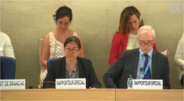A new report by the UN Special Rapporteur on the human rights of internally displaced persons (IDPs), Cecilia Jimenez-Damary, outlines the work of National Human Rights Institutions (NHRIs) in addressing internal displacement. It comes following a series of consultations with NHRIs and regional NHRI networks, including the European Network of National Human Rights Institutions (ENNHRI).
The Special Rapporteur has made the role of NHRIs in IDP protection a priority area of her mandate. In her report, which was presented at the 41st session of the UN Human Rights Council, she examines the work of NHRIs in this area, the challenges faced and opportunities to enhance their role as human rights actors.
She also outlines her engagement with NHRIs, including through ENNHRI. In April 2018, ENNHRI held a meeting and workshop in Kyiv, Ukraine, on the role of NHRIs in addressing internal displacement in (post-)conflict situations. The resulting statement – welcomed by a number of international and regional actors – was recognised by the Special Rapporteur as supportive of her multi-stakeholder plan of action on IDPs.
The report lists approaches that NHRIs can adopt to effectively promote and protect the human rights of IDPs, including:
-
Prevention, preparedness and early warning activities
-
Human rights monitoring, data gathering and analysis
-
Building internal expertise and capacity
-
Taking part in multi-institutional approaches
-
Developing and promoting national law and policy
-
Legal assistance and supporting complaints
-
Awareness-raising, education and human rights training
-
Promoting and facilitating the participation of IDPs
-
Working in proximity to IDPs
-
Reporting and providing information to the public
-
Advocating for durable solutions for IDPs
Moreover, the report mentions that NHRIs often face challenges related to funding and resources, capacity, access and security, and the political will of national authorities. However, it also acknowledges how NHRIs have demonstrated that much can be achieved through new and strategic ways, in collaboration with national and international partners.
NHRIs can engage with the Special Rapporteur by submitting information about human rights violations and meeting with her during country visits. Find out more on the webpage of the mandate.
You can download the report here.
You can see ENNHRI’s infosheet on the Georgian NHRI’s work on internal displacement here.
In order to learn more about ENNHRI’s project on the role of NHRIs in situations of (post-)conflict click here.
Source: European Network of National Human Rights Institutions

